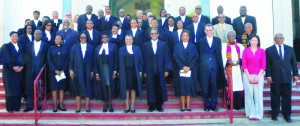
and Ministers of Religion outside St Mary’s Anglican Church
Law Year 2014-2015, for the nine member territories of the Eastern Caribbean Supreme Court, commenced on Tuesday, September 17, with church services in the various islands and a live video simultcast of the court proceedings from Anguilla.
The service in Anguilla was a joint presentation of the Anglican, Methodist and Roman Catholic Churches which comprise the Anguilla Christian Council. The sermon, delivered by Assistant Anglican Priest, Rev Samuel Knight, examined the problem of crime and the future of Anguilla which, in part, tied in with some portions of the address delivered in the High Court by Chief Justice Janice Pereira.
One of the matters that Rev Knight referred to was how true visionaries might see Anguilla in terms of crime in 20 or 25 years. “More specifically, what would Anguilla be like if we act appropriately to stem the tide of violence in our country?” he asked. “It is not what will Anguilla be like, if we don’t, but what Anguilla could be like if we act to stem the tide of violence in our country?”
He went on: “I submit it is in our hands to make the answer to this question a happy positive. But, for that to happen, there must be a firm resolution to act appropriately and resolutely to engender a citizenry with high moral standards. There must be men and women to move towards the understanding and practising of real brotherhood, to usher in a bright and glorious future for this country.
“The kind of society we yearn for in Anguilla is one in which we teach our youth more than just writing and arithmetic. The kind of society that we yearn for is one in which we teach, practice and ensure the dignity and worth of every person. The kind of society we need is one which cares for the poor; one in which the rule of law is honoured and observed. This desired goal is both a long-term project and a costly one. To accomplish this, qualified personnel would have to be provided to infiltrate our schools and engage our youth with a sense of true citizenship and brotherhood.”
Rev Knight stressed that there was a need for Government to pursue this on a long-term basis with policies which would have the involvement and continued support of succeeding administrations. “The offshoot will be a society where common good is the concern of all, then violence and lawlessness will be out of the picture,” he added.
Meanwhile, Chief Justice Pereira spoke on the vision of the Eastern Caribbean Supreme Court and the strategic efforts being made to improve the functioning of its four divisions of jurisprudence: civil, criminal, commercial and family which she said were working in varying degrees. Amidst this success, a number of challenges continued to attack these initiatives and, more fundamentally, the overall strategic vision of the court.
After reviewing the functioning of the civil division, the Chief Justice looked at the operations of the criminal division. She said that while the criminal division had been serving the pilot state of St Lucia well, in some respects, an assessment had highlighted a number of challenges which needed to be urgently addressed.
“This assessment showed that there is nothing inherently problematic with the rules regulating the criminal process, but rather the challenges that lie in the resources available, or being employed to effectively apply the rules in the management of the criminal process,” she stated.
Among other matters, she stressed the need for adequate physical facilities, equipment and staffing. “Every state within the Eastern Caribbean must take stock of the rising violent crimes in our region and must be prepared to tackle the problem in a holistic way,” she said. “Simply placing tougher laws on the statute books does not solve this. Adequate resources must be employed, not only for swift detection of crime, but also for swift prosecution.”
The Chief Justice also emphasised the need for attention to be paid to family law, and the enactment of various pieces of legislation to give the Court the necessary power to discharge its responsibilities to protect victims of domestic violence.
The Chief Justice’s hour-long address was wide-ranging and covered a number of subject areas, some of which were not dealt with in previous addresses for Law Year.
The address by the Chief Justice was followed by addresses from Mr Rupert Jones, Attorney General; Mr John Benjamin, QC; Mrs Joyce Kentish-Egan, QC; Mr Thomas Astaphan, QC; Mr Ruggles Ferguson, President of the OECS Bar Association; Ms Yvette Wallace, President of the Anguilla Bar Association; Ms Palmavon Webster; Mrs Ivena Benjamin, Senior Magistrate; Mr Kerith Kentish; the Utter Bar, and Members of the Bench.















